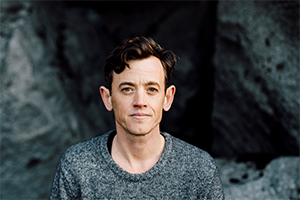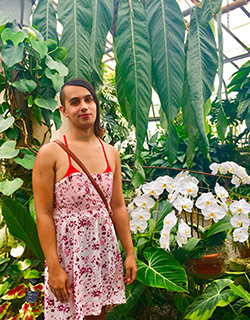Queer Perspectives: Serena Bhandar
in Conversation with Ali Blythe

Malahat board member Serena Bhandar recently spoke with Ali Blythe about their role as editor for the Malahat's upcoming Queer Perspectives issue. Alongside Trevor Corkum and Betsy Warland, Blythe will read all submissions for consideration.
The issue will celebrate the aesthetics, concerns, contributions, and achievements of queer authors living in or from Canada, recognizing their crucial role in providing a truly complete picture of what it is like to be alive in North America in the past, future, and especially today.
Click here for full details on submitting to Queer Perspectives.
Let's start you off big. For this issue, the Malahat is keeping its definition of "queer writing" intentionally broad, screening not on submission subject matter but rather on self-identification by submitters. I wonder if you have any thoughts or suggestions on how folks who are questioning or still coming into their identities might approach submitting to this issue?
Queer people are family. And any other word we might use or eschew to describe ourselves or to say hello or goodnight. Send me your poems etc. that went through your beautiful questioning, coming-into body, please. Forthwith. Forthwith? Is that the right word? I am trying not to look things up as much.
What sorts of queer narratives (including both writing by and about queer folks) have you been drawn to lately? Are there any elements or viewpoints that you're eager to read for this issue?
I seem to like small narratives. Given, no doubt, I have recently become a smallish man. One who feels up to this gig as an editor because I love having narratives sent to me. It can be raining and looking out or all lightening and open road.
The word "queer" has arguably lost its status as a slur in many contexts over the past several decades. In turn, the LGBTQ2S? community has increasingly used "queer" as a verb to describe the act of deviating from cultural norms. Do you use the word in this context? And what might it mean to you, "to queer" writing?
I don't use queer in that context, no. It isn't an act for me: something I do against, or to, a perceived norm, any more than being queer is something I do against, or to, a norm. Well, now if I change that slightly and say, "up against," it does suddenly have a certain draw. You see how it goes.
As a follow-up—the three guest editors for the Queer Perspectives issue will each be reading submissions across fiction, nonfiction, and poetry, and also considering submissions that do not fit into one of those categories. What do you think of this approach to editing, given that queer narratives, like the people who create them, already have the potential to break down and blur boundaries of form?
Yes! Great! Betsy and Trevor seem like kindred readers in this way. I will for sure slide a poem across the table to Betsy and say, "Hey, check out this poem that wants me to be a lyric essay reader." Or to Trevor if it's a prose poem that wants me to be a reader of a very short story. And how does how we perceive a form alter the way we take it in? Even if it never does much to change its own form, the form is changed, by our looking.
There is also something about having lived "up against" a constraint of gender or genre that catalyzes reinvention.
You're also the editor-in-chief for the Claremont Review, an international magazine for youth writers and artists. What roles do you see, or hope to see, youth taking on in the genre of queer writing?
The role of a writer. In the latest edition, I still have no idea who is queer, but there is a faint moon drifting ahead of the car in Margot Lee's "Idle Miles," so I don't really feel I need to know.
Your first collection of poetry, Twoism, deftly explored the expansive and strange multiplicities of gender and binaries. Do you have any upcoming projects you'd like to tell us about?
I wrote another book. It's called Hymnswitch. I wrote the first half while in an alcohol recovery program in Vancouver imagining myself lying at the foot in the Sangre de Cristo Mountains with my shirt off. The second half I wrote lying at the foot of the Sangre de Cristo Mountains with my shirt off because if you stop listening to your imagination it stops talking to you.

Serena Bhandar
* * * * * * * *









